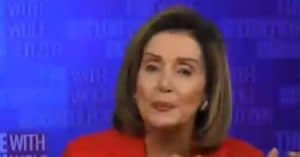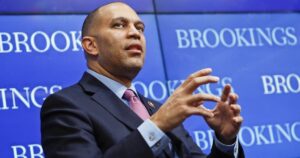Trump's Call Sways Key Republicans, Secures Johnson's Win
President-elect Trump played a pivotal role in securing the speakership for Mike Johnson by persuading two Republican holdouts to switch their votes at the last minute.
Trump’s involvement was crucial in ending the impasse and facilitating Johnson's election as Speaker of the House, although some Republicans have expressed reservations about his leadership, as reported by the Hill.
Ahead of the vote, Rep. Ralph Norman and Rep. Keith Self had withheld their support from Johnson, favoring Rep. Jim Jordan and Rep. Byron Donalds, respectively. Both lawmakers, members of the conservative House Freedom Caucus, had significant concerns about Johnson's fiscal policies. However, Trump reached out to Norman and Self, persuading them to align with the party’s choice for the speakership.
Norman and Self's Conversations Highlight GOP Dynamics
After initial voting, Norman, Self, and Rep. Thomas Massie were the only Republicans not backing Johnson. Massie had thrown his support behind Tom Emmer. As the situation unfolded, the necessity for Norman and Self’s votes became apparent to secure Johnson's victory. Additionally, Rep. Nancy Mace engaged with Trump, as early projections suggested Johnson might fall short.
During these crucial conversations, Self articulated his commitment to Trump’s agenda, particularly concerning financial prudence and deficit management. He stated he changed his vote after assurances from Johnson on fiscal responsibility. “After receiving firm assurances from the Speaker, that Republicans in the House will have strong representation during the budget reconciliation process—a cornerstone of President Trump’s agenda—I changed my initial vote,” Self explained.
Trump’s Influence on Republican Decision-Making
This shift in voter allegiance marked a turning point, enabling Johnson to clinch the necessary majority. Trump, having endorsed Johnson days earlier, praised the outcome as “an unprecedented Vote of Confidence in Congress.” He further lauded Johnson’s expected performance, predicting he will be a great Speaker whose leadership will benefit the country.
The Trump factor loomed large throughout the decision-making process, reflective of his sustained influence within the Republican Party. Norman expressed his satisfaction with Trump's intervention, succinctly reporting on social media, “[T]RUMP WAS GREAT !!” This sentiment underscores the former president's ability to rally support and initiate action among GOP members.
Speaker Johnson Faces Mixed Reactions from Republicans
Despite the victory, Johnson faces divided opinions within the party’s rank-and-file. A group of 11 hard-line Republicans, including Norman, voiced their ongoing concerns. They stressed in a statement how support for Johnson was essentially to back Trump and facilitate the timely certification of his electors, albeit with reservations about Johnson’s past performance.
This group’s statement highlighted internal party tensions, balancing loyalty to Trump with skepticism about Johnson’s capabilities as a leader. These Republicans plan to continue scrutinizing the Speaker’s adherence to strategic priorities, particularly in areas like fiscal discipline, which remains a sticking point for many.
Looking Ahead: GOP’s Focus on Unity and Policy
Keith Self underscored these priorities, reaffirming his commitment as the House approaches critical roles such as budget reconciliation. He noted, “I appreciate Speaker Johnson addressing these critical issues. Let’s get to work!” indicating a willingness to collaborate while maintaining vigilance over policy execution.
As Johnson settles into the role, he will need to navigate varied expectations from his colleagues. His leadership will inevitably shape the legislative landscape, heavily influenced by Trump’s agenda and the distinct pressures from both moderate and more conservative factions within the party.
The Road Ahead for the GOP and Trump’s Continued Role
The broader implications of this development signify the sustained impact of Trump’s political strategies and his continued influence over Republican priorities. Johnson’s tenure will be closely observed, with both supporters and skeptics evaluating his effectiveness in addressing pressing policy issues.
Ultimately, as the GOP moves forward under Johnson’s leadership, the dynamics within the party will remain a subject of intense scrutiny. Trump’s active engagement exemplifies his role not only in shaping specific outcomes but also in fostering a vision that seeks to redefine political benchmarks within the Republican Party.
As this new chapter begins, Johnson will face the challenging task of aligning divergent Republican voices, ensuring the party’s strategic goals are met while addressing constituent concerns across the nation.




